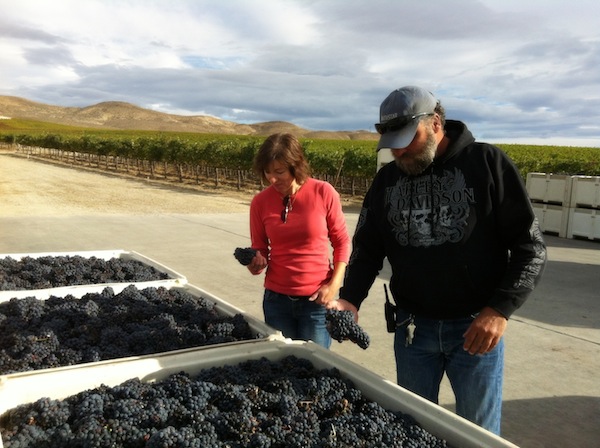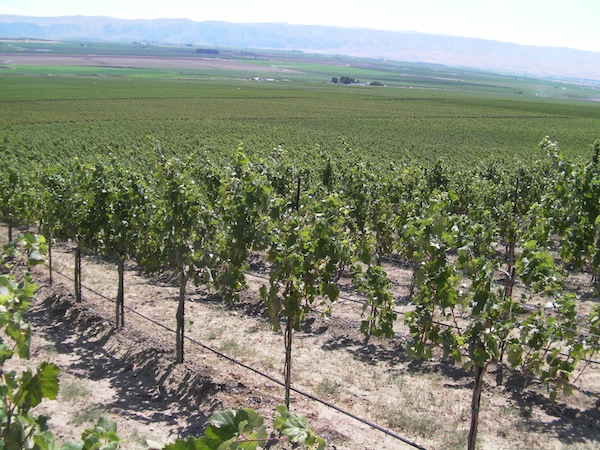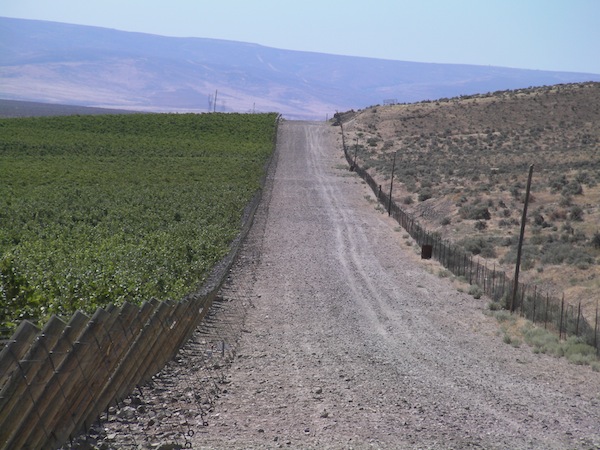
MATTAWA, Wash. – Some of Tedd Wildman’s most important jobs led him to large vineyards along the Wahluke Slope, which meant long drives east and west along Road 24 beneath the Saddle Mountains.
A 257-acre parcel nearest to the top of the mountain continued to enchant him.
“As a private consultant years ago, when working on the Slope, I would often look up at the property – then an apple orchard – and dream of turning it into firewood and planting wine grapes,” Wildman told Great Northwest Wine.
StoneTree Vineyard near Mattawa, Wash., quickly became a site coveted by winemakers throughout the Pacific Northwest. Wildman’s number of clients stands north of 40, with more hoping to get in.
“I feel it is one of the top five vineyards in the state,” said Chad Johnson, co-winemaker of Dusted Valley Vintners in Walla Walla.
Oregon winemaker Ed Fus of Angel Vine in Carlton devotes much of his portfolio to the Petite Sirah, Primitivo and Zinfandel from StoneTree. He arrives the night before and devotes a roundtrip of more than 500 miles to receive his allocations.
“Where else am I going to get that quality?” Fus said. “It doesn’t exist.”

WSU extension agent made key introduction
The seed for StoneTree Vineyard was nurtured by an agent from the Washington State University cooperative extension, who arranged a meeting for Wildman via the Washington Association of Wine Grape Growers.
“In 1999, then-Benton-Franklin co-op extension agent Jack Watson introduced Mark Wheeler to me at a WAWGG event, and we began the project,” Wildman said.
The next year, they created StoneTree Vineyard, named as a tribute to the petrified trees found in the area. And in an amazingly short period of time, Wildman and Wheeler, a medical software executive, began helping wineries produce some of the top wines in the Northwest.
Winemakers continue to be amazed by the evolution of StoneTree, and it’s difficult for them to decide which the 15 varieties do best.
“All of them!” Johnson said. “Honestly, it’s crazy. As far as the Rhône varieties — Mourvédre, Grenache, Syrah, Cinsault and Viognier — from early ripening to late ripening, they all present well. Even in cool years, everything ripens up there. It’s the same for the Bordeaux varieties, even Petit Verdot at the end. And Petite Sirah. You just let them hang, and they are all rocking.”
Dusted Valley first entered StoneTree in 2007, and the Wisconsin winemaking family traditionally produces at least two vineyard-designate wines from Wildman’s site each year, Johnson said.
This year, Dusted Valley bottled five wines labeled “StoneTree Vineyard.”
A hallmark of Dusted Valley wines is the showcasing of acidity, and StoneTree plays into that.
“It struggles to get canopy and it hangs onto its acid,” said Corey Braunel, Johnson’s co-winemaker and brother-in-law.
Braunel and Johnson were tipped off to StoneTree by one of their famous neighbors, Northstar winemaker David Merfeld and his predecessor, Gordy Hill.
“Merf has been getting Merlot from out of there, and the Ste. Michelle people were always talking about StoneTree,” Johnson said. “Most everything has been contracted with Ste. Michelle. It’s only recently when the smaller guys have gotten into it.”
Wolfe helps Oregon winemaker gain access to StoneTree
For Fus, the StoneTree connection came from another renowned Washington winemaker and viticulturalist.
“I was lucky enough to hear about it from Wade Wolfe, and he hooked me up with Tedd,” Fus said. “That’s how I got in there, so in 2008 I started getting Zinfandel, Primitivo and Petite Sirah from there.”
He’s particularly enamored with the Zin.
“Zin is always black-fruited and tends to be more muscular, but at StoneTree it’s got a softer touch of the tannin that the Wahluke Slope gives you,” Fus said. “Even in cooler years, it’s not so cool there.”
Fus estimates that about 50 percent of his production each year stems from StoneTree, and Angel Vine’s flagship wine is a proprietary red blend called The Hellion.
“That wine represents our pick of the barrels, and some years it’s 100 percent StoneTree,” Fus said. “StoneTree fruit comes in earlier than most of the sites we work with, and I usually make three trips to get all of our fruit. It takes six hours to get back to Carlton, and it usually means driving through Portland a rush hour, but it’s such a good vineyard.”

Cab, Columbia Crest dominate StoneTree’s plantings
And yet, much of StoneTree is planted to Cabernet Sauvignon as a result of the long-term partnership with Columbia Crest. That relationship began with Rich Wheeler, who recently retired as Vice President of Vineyards for Ste. Michelle Wine Estates.
“Going back to the beginning, I’m obliged to Rich,” Wildman said. “He was in charge of grower relations with Stimson Lane then and was basically my first contact with them. We sketched out some notes on a barroom napkin, coming up with a list of varieties they were interested in. He told me, ‘Just plant as many different clones as you can.
“So I did as much research as I could and managed to pick some fairly good ones,” Wildman continued. “I’m not disappointed with any of them. Based on this experience, I think climate and geology trump clonal selection.”
Walla Walla wineries turn to StoneTree in 2004
A turning point in the commercial success came early in StoneTree’s history when winter kill wiped out most of the 2004 vintage for the Walla Walla Valley. That year, StoneTree supplied those wineries with just fourth-leaf fruit, and they’ve come back year after year seeking more.
“You never want to be proud of taking advantage of someone else’s misfortune, but in the big picture, it gave me an opportunity,” Wildman said. “It was a big break for me. It led to a number of longtime customers in very good standing, including L’Ecole No. 41. I respect Marty Clubb immensely for what he’s done with his brand, and I’m proud that he’s used some of my fruit.
“The same goes for Chuck Reininger and Brian Carter, as well as Bergevin Lane, Dusted Valley, Forgeron and Long Shadows,” he added. “They’ve all been important long-term customers of ours. And Ed Fus is one of my heroes.”
Wildman proudly noted that Dunham Cellars recently became a client.
Love keeps Indiana farm boy in Prosser
Wildman comes across as direct, precise and humble, each understandable considering his background. He grew up on a family farm in Indiana, leaving in 1981 to pursue a master’s degree in entomology at WSU. Soon after arriving at the school’s research station in Prosser, he met a German winemaker studying closely with famed viticulturist Walter Clore. Anke Freimuth changed Wildman’s life and became his wife.
“I wouldn’t even have been a wine drinker had I not met her,” Wildman said. “I didn’t know anything about wine, and I guess that’s similar to the way the wine market works. It seems a lot of men are getting into wine because women like wine. We’re kind of a living case history for that.”
Wildman’s education expanded with his association with Wolfe and during sessions sitting at the kitchen table with Freimuth as part of her blending trials. That’s about as close as he gets to percentages, weather data and points awarded to StoneTree wines.
“I tend not to focus on things like that,” he said. “I’m much more focused on just doing the best job that I can growing grapes. I don’t even track heat units.”
His background in the wine industry stems from his early days in the Columbia Valley when he used his entomology background to consult farmers growing a variety of crops. And StoneTree benefits from that expertise.
“I probably end up using less pesticide than your average grower,” Wildman said.
Then again, terms such as “normal” and “average” seem counter to Wildman’s reputation and approach.
“I don’t know what’s normal,” he said. “I come from old farming families on both sides of my family. When I first moved to Prosser, I met a dryland wheat rancher in Whitstran who told me, ‘I’ve been in farming for 75 years and I’ve still not seen a normal year. I’m still waiting for one of those ‘normal’ years.’ ”
StoneTree’s winning formula not ‘by the numbers’
Even though he doesn’t analyze the hanging clusters or judge the finished wines “by the numbers,” ask his winemaking customers and it would seem as though Wildman has not made any missteps as grower.
“Tedd’s a sharp guy,” Braunel said. “He had been driving around the state for years before picking that land.”
An accountant’s ledger tells him that perhaps he should have taken a different approach early on at StoneTree, which ranges in elevation from 930 feet to 1,250 feet.
“Looking back it could have been all Cab to begin with,” Wildman said. “Rich (Wheeler) and I decided it’s a Cabernet site, but it will ripen anything — and everything seems to do well there.”
Considering his contracts with Ste. Michelle Wine Estates, it’s probably a waste of time for those on the waiting list to ask for Cab.
“It depends on the variety, and I frequently get questions from those who are not customers,” Wildman said. “There are some dribs and drabs of Barbera and occasionally Zinfandel, and if a new customer wants to dabble in those, they can get their foot in the door.”
The only white grapes grown by Wildman are a couple acres of Viognier.

Wildman looks to expand Wahluke Slope holdings
Fortunately for consumers and winemakers, there may be more amazing fruit to come from Saddle Mountain Vineyards LLC — the partnership among Wheeler, Wildman and three others that started at StoneTree with a 25-year lease from the state Department of Natural Resources.
“We are halfway through the lease,” Wildman said. “We anticipate renewal and are working on obtaining another parcel on the Slope to develop another vineyard.”
Wildman and Freimuth continue to live in Prosser, where they are raising three teens — the oldest already a firefighting paramedic. Freimuth recently pulled away from her two Yakima Valley winery clients and now is focusing her attention on a new Zinfandel project using her husband’s grapes.
“I just feel fortunate to have the opportunity to develop such a great site,” Wildman said. “I try to pay attention to detail and do what’s right.”

Great Article. Love Tedd and Anke and glad their story is getting told. But this vineyard is a darkhorse to make the Top Ten.
By my count this is number 8. So which of the following are you guys leaving off your list of WA Top Ten, DuBrul, Champoux, or Boushey?
Do you have a contact for Stonetree Vineyard?
We are wine makers that would like to purchase grapes from them.
Thank you,
Susan Howard
Greetings, Susan.
I sent a reply to your email account.
Sincerely,
Eric